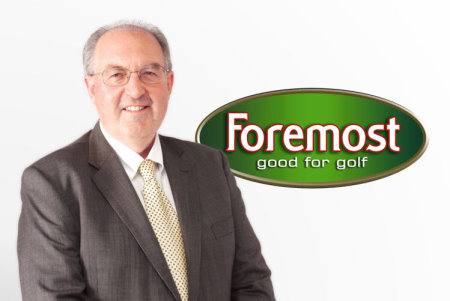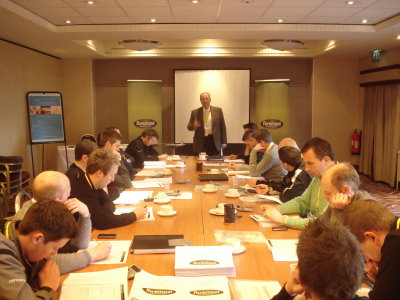GBN.com speaks exclusively to Foremost Golf’s CEO Paul Hedges who believes golf clubs need to hand PGA professionals a more prominent role if they are to succeed in their effort to overcome the worst effects of the recession
 2012 was a difficult year for grass roots golf and the signs are that 2013 might not be much better. What do you see as the biggest problems facing golf clubs around the country?
2012 was a difficult year for grass roots golf and the signs are that 2013 might not be much better. What do you see as the biggest problems facing golf clubs around the country?
Right now, the situation, as I see it, is that the golf industry is struggling. Golf clubs are finding it increasingly difficult to balance their books. There are a lot of clubs with gaps in their membership. Corporate golf has been devastated by the recession, so that whole strand of income has been almost wiped out. Societies tend to be smaller and fewer and, while green fees have remained relatively stable, the nett income achieved from them is down because they have been compromised by things like 2 for 1 promotions.
It is a difficult situation and it has been compounded by the fact that a lot of golf clubs have been concentrating purely on cutting costs rather than looking at the potential areas where they might increase revenue. That is understandable but there is only so much you can do to cut costs before you start to compromise the service you offer. A number of golf clubs are starting to reduce the number of green keepers they employ but that, almost inevitably, means the quality of the golf course will deteriorate. I would suggest that it is very dangerous to concentrate totally on the balance sheet because after a while it becomes something of a vicious circle. The more you cut costs, the more you compromise service and that in turn will inevitably affect a club’s ability to generate new members and green fee business.
How has the recession affected club professionals?
Some clubs have also begun to look at the role their professional plays and in a few instances have decided he does not represent value for money. At Foremost Golf we would argue strenuously this is not the case but it is not an argument we’re are going to win unless we can convince club officials that professionals are not just a drain on resources but can actually provide the club with a skill set which will be vital in growing golf at their club and help them break away from the financial abyss.
What do you mean by that?
I think in a lot of instances clubs under-estimate what a professional can do for them and I certainly believe they do not utilise their professional to the best advantage. All too often, clubs employ a pro to collect score cards and do other menial tasks like that. In a lot of instances, what is happening is that golf pros are being directed into an admin role which diverts them away from the more important task of helping the club to generate income. The bottom line is that clubs do not utilise their professional’s skills to their best advantage. The PGA stresses in its marketing that professionals are at The Heart of Golf and I’d agree that is where they should be. Foremost’s strapline is that our members are Good for Golf, but that can only happen if they are allowed to be.
How can clubs get the most out of their professionals?
They can do that by utilising their skills to the best advantage. Pros are highly qualified people and should be treated as such. They should be engaged to drive membership. They should be incentivised to increase green fee business in such a way that it is mutually beneficial to both parties. They need to be handed a much more central role in club life to help grow golf at the club for the benefit of all.
What can pros do to help this happen?

At Foremost we have been heavily involved in promoting an initiative known as the ‘BlueSky’ concept and it is something the PGA has now adopted. The ‘BlueSky’ concept revolves round a simple belief that golfers will play more golf if they play better golf and enjoy their golf more. The person who can influence that most is the golf professional. It’s not the club manager. It’s not a club secretary or a club steward. It’s the golf pro because he has direct access to club members and, more importantly, also has the skills required to help them play better, both by giving them lessons and selling the equipment that will help them get the most out of their games. The professional is the Golf Club’s front man or first point of contact at the club and is why the role is so pivotal to the growth of membership, green fees and activity at every club.
Where does the ‘BlueSky’ Concept name come from?
Golf Clubs need a Club Manager AND a Club Professional!
The objective of the ‘BlueSky’ Concept is to enhance the profile of the professional and to help clubs understand how they can get the most from the expert they have chosen to employ.
The aim is to position the professional in a key role at a club and in doing that there is no conflict between the club pro and the club manager. They both have separate roles to fulfil. There have been instances when a pro has become a club manager but in that situation he cannot be expected to fulfil both roles. That would be unrealistic. You can’t do both. If a pro becomes Director of Golf or Club Manager, the club needs to bring someone else in to fulfil the ‘BlueSky’ role. The fact is you still need a pro. In a perfect environment, I am not convinced it’s a good idea for golf pros to replace club managers because the role as administrator takes them away from the very area they can contribute most. It’s like in my business. I don’t type letters (a) because I’m not very good at it and (b) because I’m at a salary level which dictates that I should be concentrating on the bigger picture. There are better uses for my time and it’s not the best use of a golf professional’s time to be collecting club completion monies, issuing scorcards and sticking notices up on boards. There are other people who can do that.
What is Foremost’s role in preparing its members to create ‘BlueSky’ days?
When Foremost first started we were a buying group. We had one single business proposition. We had a business model which was to aggregate the buying and thereby deliver a better buying price to the pro. Then, after a few years, we began to explore every other avenue where we could add value for our members. We have started to run educational workshops to help our members overcome some of the challenges they face in day-to-day business. We have set up a Golf Club Buying Group and are constantly stressing how important it is for our members to market their business more effectively. I have a little phrase I have used ever since I started Foremost which is “Do and Tell”. As a golf pro – or in any business for that matter – you have two challenges. You have to do the job properly and then you also have to tell potential customers what you can do for them. It’s amazing, even now, a lot of pros don’t do that. And yet they still wonder why golfers are not queuing up to get lessons, get custom fit, whatever.
What can Foremost do to help members improve their skills in this area?
 We have created an Elite Marketing Programme (EMP) that our members can use and it has the key objective of helping our members communicate to their golf club members. This in turn helps the golf club members get more from their club and more from their golf. If club members play better golf and enjoy their golf, that is better for golf clubs and all stakeholders in the club.
We have created an Elite Marketing Programme (EMP) that our members can use and it has the key objective of helping our members communicate to their golf club members. This in turn helps the golf club members get more from their club and more from their golf. If club members play better golf and enjoy their golf, that is better for golf clubs and all stakeholders in the club.
The newsletter crucially includes content on what is happening at the club from member news to events etc. Again good for Club and Club Professional alike.
Our EMP is a great tool to help overcome this. The fantastic thing about the personalised emails we send out on behalf of EMP members is that they are a very economic method to illustrate how knowledgeable our pros are. It helps the pro to extend his conversation to all the members and to promote all the services and special offers he is offering.
When I was a pro, I was busy giving lessons, doing the admin in the shop, stuff like that. A lot of members didn’t see much of me because, half the time, I was doing something else. Today, the pressures are just as great, probably greater. Pros simply don’t have the time to stand around talking about the benefits of custom fitting but they can get that message across via their EMP personalised emails. This has proved to be an effective means of communicating with customers and it’s not time consuming for our members because we put it together for them based on what we know they want and need.
How does it work?
As part of the EMP, we send out regular personalised emails to a Club pro’s data base. The pro talks to our staff about what he wants in these emails and then our expert puts the contents together for him. Incidentally, it’s astounding to see how bad some pros still are at collecting email addresses. Yet it isn’t difficult. I have always felt the best way to build an email list is just to be very up front about it. Every time someone comes into the shop, or phones up, the pro and his staff should ask for an email address, telling them they’d like to send them special offers, coaching advice and keep them up-to-date with what’s happening at the club on the course and club events. Put that way, I reckon about 95% of members, and almost as many visitors, would be delighted to sign up, particularly as it is free.
Within a few weeks, there is no reason why a pro can’t collect several hundred email addresses which he can use time and again. I can’t give you exactly numbers but our “unsubscribed list” for the EMP newsletters is something like 0.01%. People don’t unsubscribe because they are receiving something on a subject they are passionate about from someone they have a relationship with, namely their pro. The reader rate we get is around 35% which, it should be stressed, is massively above industry norms.
What was the idea behind setting up the New Foremost Golf Club Buying Group Initiative?
We unashamedly set the Buying Group up because we wanted to help the pro and the club. Part of what we’re trying to do is to get the club and the pro to be able to cooperate on a number of different levels because as they say both are in the ‘same boat’. We have no aspirations to make money from the Club Buying Group. I have a 5-Year business plan which at the end of the 5-year period shows us breaking even. I’m not doing it to make money. In fact, effectively there is no membership fee. The income we do get comes from supplier kick-backs not from the club. They pay nothing for it. We do it because, if the club is healthier, the chances are that its relationship with their pro will be healthier too. The Buying Group helps our core business which is supporting our pros. It’s a virtuous circle.
The feedback we have been getting is extremely positive. We have around 120 clubs in the Group and that number is growing all the time. We believe we can provide substantial savings on a wide range of goods and services from banking through to photocopy machines, to course and driving range equipment, to furniture in the clubhouse, to food and beverage, the whole thing. We have demonstrated a club can save anywhere from £10,000 to £25,000 a year on their overheads. We haven’t cut in the sense we haven’t reduced anything. We have just altered the buying proposition to ensure they get a good deal on everything they buy.
For the last few years Foremost has run a series of Spring Workshops offering members advice on retailing, marketing and other key areas of their business. How important are they?
Education is central for us. We have worked hard, and continue to work hard, to enhance the profile of our members. We have stressed our members have the skills to be able to play a significant role in the running of a golf club but they have to be able to back up that claim.
 To illustrate this, in the last 18 months we have invested in a team of 5 ‘expert’ retail consultants to help our member pro’s bring a quality retail proposition to their clubs. The team are experts in their field with extensive experience from the retail sector outside golf and able to offer vital business advice along with assistance on store layout and merchandising. The team’s experience comes from the retail sector outside golf but also from extensive managerial experience from the likes of American Golf and Direct Golf giving an insight in how to compete in a rapidly changing retail environment.
To illustrate this, in the last 18 months we have invested in a team of 5 ‘expert’ retail consultants to help our member pro’s bring a quality retail proposition to their clubs. The team are experts in their field with extensive experience from the retail sector outside golf and able to offer vital business advice along with assistance on store layout and merchandising. The team’s experience comes from the retail sector outside golf but also from extensive managerial experience from the likes of American Golf and Direct Golf giving an insight in how to compete in a rapidly changing retail environment.
Training – Spring Workshops
The Club Pro is the golf expert – anyone can sell a can of coke of a sweater!!
The Spring Workshops are absolutely key to this. We will cover a wide range of in those workshops. We pass on advice about how pros can protect their jobs by being better at communicating with their customers and also on how they can go to the golf club with propositions to help to drive revenue and memberships. We want to move away from the old-fashioned retainer which was more of a gift than a proper business relationship.
We will also deliver a lot of retail advice at the Workshops. That’s still very important. Retailing may not make the pro a lot of money but it sure as hell can lose them a lot of money. There is no doubt selling woods, irons, balls etc has become less and less profitable and that has led to some pros abdicating from that and instead concentrating on selling sweaters, drinks and things like that. That is an understandable reaction but, in my opinion, it’s also wrong because it removes one of the key areas in which a pro can make a massive difference. You don’t need to be an expert to sell someone a sweater, or a bag, even a trolley. But you need specialist skills to be able to sell a wood or a set of irons that works. Providing a solid custom fitting service also comes into this category. Both add value to a golf club and give members a service they will not get elsewhere. Both, done properly, enhance the pro’s standing. They give him a useful USP, if you like, and that’s important if he is to be seen as an indispensable part of club life.
Paul Hedges, Thank you very much.

